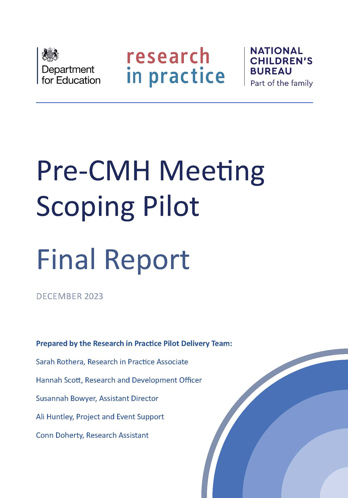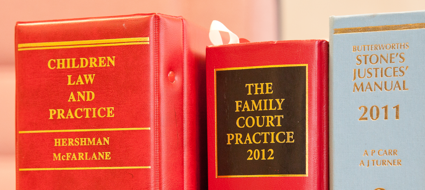Pre-Case Management Hearing Meeting Scoping Pilot: Final Report
Introduction
This report evaluates the initial pilot of a Pre-Case Management Hearing (CMH) meeting, commissioned by the Department for Education to reduce backlog in the family courts. The work piloted an early conversation between the social worker and children's guardian to explore the impact this had on the effectiveness of the CMH.
The Pre-CMH meeting was seen as a means of formalising good practice and providing structure, consistency and transparency of a conversation between the social worker and children's guardian at the start of care proceedings. The pilot identified benefits of this meeting, challenges to broader implementation, and recommendations for a wider roll out in 2024.
Executive Summary
The Pre-CMH meeting, as envisaged in the commission for this pilot, is an early conversation between the local authority and children’s guardian. Research in Practice’s Pre-CMH meeting scoping pilot delivery was designed to support sites to develop an evidence-informed approach to setting up and conducting these meetings and to explore the impact these conversations might have on the effectiveness of a subsequent case management hearing (CMH).
An early conversation between the local authority and children’s guardian is recognised as good, standard practice, albeit that such practice may have drifted over time, so the proposition was uncontroversial in concept. The Pre-CMH meeting was seen as a means of formalising and providing structure, consistency and transparency to these conversations. Stakeholder feedback indicates a range of potential benefits, including:
- Building a stronger professional relationship between the social worker and children’s guardian.
- Creating space to share information, ask questions and clarify any gaps in assessment.
- Developing a better understanding of the child’s case and arriving at the CMH more prepared.
- Narrowing the scope of the assessments directed.
- Where appropriate, reduce the number of assessments directed at CMH that might repeat work undertaken by the local authority during pre-proceedings.
A total of 23 of the 25 selected sites were onboarded to the pilot while one withdrew during the pilot. Across these participating sites a total of 108 Pre-CMH meetings were completed.
The project timeframe precluded an outcomes evaluation. Instead, the delivery team undertook a process evaluation to examine the underlying theory and assumptions that a Pre-CMH meeting would improve the effectiveness of the CMH and examine stakeholder perspectives on the rationale that a more effective CMH may contribute to reduced delay in care proceedings.
The delivery team approach was comprehensive and included:
- Providing online learning and development opportunities throughout the pilot.
- Supporting a distributed network of pilot sites to enable interprofessional knowledge exchange.
- Scoping with key stakeholder groups their response to the Pre-CMH meeting proposition.
- Providing a range of outputs to support pilot sites in swift start up, information sharing with local stakeholders.
Pilot participants considered a range of themes during learning workshops and drop-in sessions provided online. As flagged in early discussions with the commissioner, there are aspects of the discussion between social workers and children’s guardians around which there are risks of professional boundaries becoming blurred. Participants were alerted to these issues, particularly in relation to the extent to which positions and expert assessments should be discussed during the Pre-CMH meeting. Stakeholders were able to agree some principles regarding professional boundaries; nevertheless, participant feedback indicates that in practice these boundaries were not always clear in meeting discussions.
The wider rollout of the Pre-CMH meeting pilot planned by Department for Education (DfE) for 2024 offers opportunity to build on the scoping pilot work in relation to some key considerations:
- The scope of the Pre-CMH meeting as an information sharing but not decision making forum.
- Challenges for timetabling and for staffing resource across all stakeholders in rolling the approach out at scale.
- Representation of the parent, child, and wider family voice.
- The impact of the Pre-CMH on case outcomes and any associated cost benefits.
- Any future statutory arrangements.
Professional Standards
PQS:KSS - The law and the family and youth justice systems | Promote and govern excellent practice | Shaping and influencing the practice system | Confident analysis and decision-making | Purposeful and effective social work | Creating a context for excellent practice | Quality assurance and improvement | Support effective decision-making




